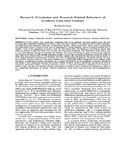| dc.contributor.author | Nenty, H.J. | |
| dc.date.accessioned | 2011-03-07T10:25:11Z | |
| dc.date.available | 2011-03-07T10:25:11Z | |
| dc.date.issued | 2009-04 | |
| dc.identifier.citation | Nenty, H.J. (2009) Research orientation and research-related behaviour of graduate education students, Journal of Social Sciences, Vol. 19, No. 1, pp. 9-17 | en_US |
| dc.identifier.issn | 0971-8923 | |
| dc.identifier.uri | http://hdl.handle.net/10311/732 | |
| dc.description.abstract | At the students’ level, researchers’ orientation tends to be undefined and hence students easily fall prey to having their orientation determined by factors other than those related to the nature of their research problems. The difficulties they experience especially in quantitative methods, biased supervisory advice, research orientations and motivational factors constitute some level of impediment to content learning, choice of research problem and to students’ views of the importance of research skills for their future work. The tendency is for them to narrow their choice of problem to only that which will suit their non-crystallized orientation. This exploratory study tried to look at such interconnected web and to determine the influence of research orientation on some research-related affective and cognitive behviour of UB graduate education students. To test the six research hypotheses posited to guide the study, data were collected from 78 UB graduate education students who registered for education research courses in 2006. These hypotheses were tested by carrying out z-test of independent proportion, chi-square analyses and one-way ANOVA statistical analyses. The results showed that a significantly higher proportion of the students prefer qualitative to quantitative research and gender has a significant influence on such preference. Research orientation was found to have significant influence on attitude towards research, research motivation, and perceived level of intellectual demand by research; but not on intention to enroll in a doctoral programme; willingness to be involved in research study; and their self-reported academic performance in research course. Problem with numbers was found to be a significant determinant of students’ research orientation. These results were discussed and recommendations made. | en_US |
| dc.language.iso | en | en_US |
| dc.publisher | Kamla-Raj Enterprises http://www.krepublishers.com | en_US |
| dc.subject | Students | en_US |
| dc.subject | Education | en_US |
| dc.subject | Research | en_US |
| dc.subject | Qualitative research | en_US |
| dc.subject | Quantitative research | en_US |
| dc.subject | Research motivation | en_US |
| dc.title | Research orientation and research-related behaviour of graduate education students | en_US |
| dc.type | Published Article | en_US |
| dc.link | http://www.krepublishers.com/02-Journals/JSS/JSS-19-0-000-09-Web/JSS-19-1-000-09-Abst-PDF/JSS-19-1-009-2009-799-Nenty-H-J/JSS-19-1-009-2009-799-Nenty-H-J-Tt.pdf | en_US |

